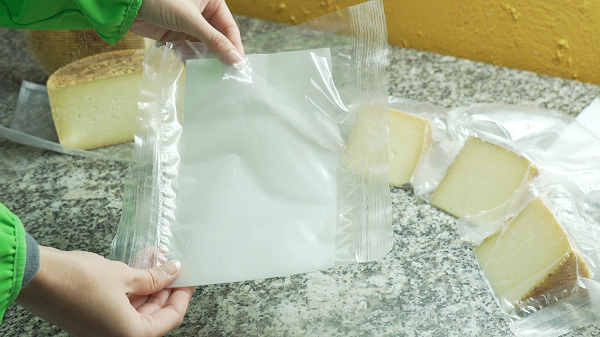It is now possible to use whey, a by-product of cheese production, to extend the shelf life of cheese by up to 10 days.
The Agri-Food Business Federation of the Valencian Community (FEDACOVA), AIMPLAS, the Universitat de València, ADM Biopolis, and cheesemakers Dehesa Dos Hermanas and La Cabezuela, have managed to reintroduce whey into the small-scale cheese industry in the form of innovative natural active packaging with antifungal properties, and as a probiotic ingredient for animal feed.
These are the final results of the GO ORLEANS research project, a circular economy project that has made it possible to reuse a by-product that currently goes to waste in small and medium-sized cheese companies, and that can also cause environmental problems due to its high organic load. This project reuses whey to improve the preservation of cheese, reduce food waste and provide probiotic additives for livestock feed that contribute to animal welfare.
Specifically, AIMPLAS developed an active coating with antifungal properties based on whey that can extend the shelf life of cheese by 25% to 50%. This active coating is included in packaging using conventional printing technologies. The Universitat de València worked on the selection of antifungal strains present in whey to obtain bioactive ingredients through fermentation. ADM Biopolis was in charge of determining the probiotic capacity of the active components extracted from whey and the suitability of adding them to animal feed.
Cheesemakers La Cabezuela in Madrid and Dehesa Dos Hermanas in Huelva supplied the whey, selected the cheeses and validated the new packaging, which is not only one of the most effective solutions against food waste, but also favours cheesemaker competitiveness and promotes innovation in the dairy industry.
Natural active packaging therefore makes it possible to market healthier products made without synthetic preservatives and extend the shelf life of cheese, which opens up new business opportunities with customers in more remote regions. Thanks to the commitment to innovation and technology, new solutions are made available to small cheesemakers, which make up more than 90% of all cheesemakers in Spain.
Besides validating these developments at the collaborating cheesemakers, FEDACOVA also transferred the project results to the Valencian agri-food industry at a conference held on 23 February in Valencia. The GO ORLEANS Project responded to the needs of cheesemakers to recover waste, reduce food waste, and bring new production and preservation processes to market to extend product shelf life. The project also provides solutions to the need for more natural new products for the livestock industry with high added-value probiotic activity.















